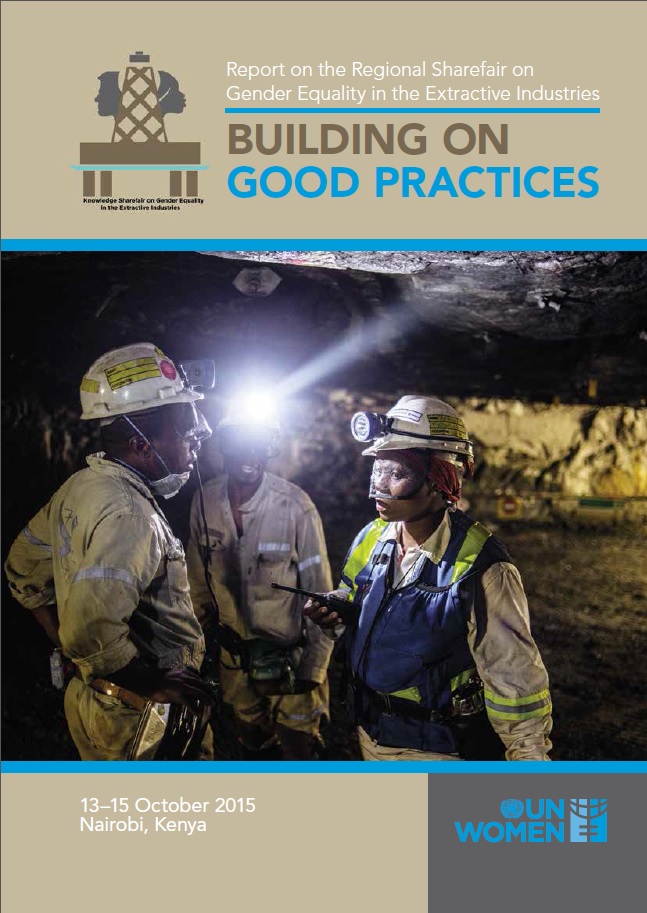
Report on the Regional Sharefair on Gender Equality in the Extractive Industries

The United Nations Entity for Gender Equality and the Empowerment of Women (UN Women) – in collaboration with key partners – held the first ever Regional Sharefair on Gender Equality in the Extractive Industries from 13–15 October 2015 at the United Nations Complex in Nairobi, Kenya. Focusing on the overarching theme of Building on Good Practices, the three-day Sharefair (which can be viewed online at http://africa.unwomen. org/en/news-and-events/stories/2016/01/ regional-sharefare-on-gender-equalityin- the-extractive-industries) served as an inspiring platform for sharing knowledge and experience, establishing partnerships, and developing solutions to stimulate interest and collaborative efforts in engendering the extractive industries in Africa.
Four hundred and thirty participants – including researchers, policymakers, development agencies, United Nations agencies, regional economic commissions, the African Union, civil society organizations, women in the extractive industries, business leaders, investors, private sector representatives and practitioners – gathered at the Sharefair to discuss innovations, good practices, evidence from research and documented data, and legal frameworks and policies. The Sharefair also provided opportunities for networking, advocacy and capacitybuilding in support of women in the extractive sector.
Through a series of plenary and interactive group discussions, challenges, solutions and opportunities were identified for gender equality and women’s empowerment in the extractive industries. Trends in the sector were discussed, and feasible interventions to amplify the impact of gender equality in the extractive industries were identified. Diverse opportunities for knowledge sharing and networking were provided via the Sharefair exhibition booths. These featured over 50 organizations and women in the extractive industries exhibiting their products and services – affording a novel way of connecting participants and industry players. Throughout the Sharefair, special attention was given to the role of women in the extractive industries in the post-2015 development agenda.
The first day of the Sharefair focused on unpacking the issues and opportunities for women in and affected by the extractive industries. It was filled with voices of women in the sector sharing their personal stories and testimonies. The second day – which included the official opening ceremony for the Sharefair – highlighted extractive industries policy frameworks and legislation with a focus on women’s needs and opportunities in the sector. Participants engaged in high-level panel discussions on policies for engendering the sector; also, a video address by the UN Women’s Executive Director, Phumzile Mlambo-Ngcuka, on vi gender-responsive national regulatory extractive policy frameworks was streamed to participants. The third day engaged participants in sharing knowledge and good practice from private sector engagement in communities. The day showcased research papers and evidence around policy frameworks, socioeconomic and environmental impacts of extraction, women’s participation in the extractive industries and domestication of the African Mining Vision.
The Sharefair concluded with the development of an pathway/outcome document for gender equality and women’s empowerment solutions in the extractive industries – a culmination of the lessons learned and discussions of the past three days. This pathway document focused on critical intervention areas that could spur gender equality in the extractive industries including national and regional policy and legal considerations; advocacy, capacity and communication; research, knowledge management and capacitybuilding; private sector development; business development and innovation; and a repeat of the Sharefair to fast-track the proposed intervention areas.
The recently approved Sustainable Development Goals – especially Goal 5, Achieve gender equality and empower all women and girls – and their 40-plus gender-related targets also create new opportunities to reconnect, recommit, and mobilize political will and public support for women’s economic empowerment.
Katherine Muoki,
Directorof Planning, Gender Directorate,
Ministry of Devolution and Planning, Kenya